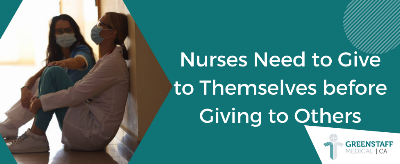
Self-care is imperative to personal health, professional growth and willingness to continue to provide care for others. However, nurses are often hesitant to take time to care for themselves. Neglecting self-care can lead to stress, exhaustion, and fatigue, which affects professional performance and decision-making. Nurses cannot keep giving to others and caring for others if they don’t care for themselves first.
According to the World Health Organization (WHO), self-care is defined as "what people do for themselves to establish and maintain health, and to prevent and deal with illness."
The nursing career is mentally, physically and emotionally exhausting. Nurses give so much of themselves to care for patients and their families, that their own well-being is left behind. Nurses more often than not put the needs of their patients above their own.
Self-care is important for workers in every field, but especially for nurses, who are exposed to pain, suffering and trauma. Nurses are often traumatized and don’t even realize it. Making time for self-care and overall wellbeing reduces stress and improves the quality of care nurses provide. Even nurses’ cups run dry – by practising self-care, it replenishes the capacity to provide compassion and empathy.
The COVID-19 pandemic has been and still is very stressful for nurses. Nurses have showed up to do the best they can with the resources and information they had available. They had to go through many challenges through the pandemic, looking after their patients, putting their lives at risk of catching the virus and bringing it home to their loved ones. Apart from fighting for their own safety, they had to fight for the lives of others.
Nursing can be hard on one’s emotions. While there are experiences of highs, there are also the lows of seeing patients’ health worsen despite of your best efforts. You may even lose patients who you've built relationships with, and this can take a toll on work performance as well as home life. It's important to ensure that as nurses, you have an outlet to express these difficult emotions.
Nurses need to be aware of their own needs and practice self-compassion before they can help others. Practicing self-care and being kind to ourselves, strengthens the empathy and kindness we have towards others. Being empathic leads to better communication with patients, families, and colleagues. This process allows a deeper understanding of what matters to patients, and how to act with kindness and compassion to relieve their suffering and distress.
Self-care gives nurses the opportunity to regulate their emotions in an appropriate environment to avoid experiencing the pain of others. Nurses can become overwhelmed by distressing emotions concerned with their patients when they are not able to control their own emotions.
Stress, along with the neglect of self-care can lead to unwanted, unhealthy lifestyles. When the hormones cortisol and adrenalin remain in the blood stream for too long, the results can be hyperglycemia, hyperinsulinemia, arteriosclerosis, hypertension, and a decrease in the function of the immune system.
Yes, it is an honour to be a nurse and to provide high-quality healthcare to the public, but amidst the pandemic, science and overwhelming instability, being a nurse has only led to exhaustion, stress and burnout. The solution goes beyond selfcare. It requires change in structures, health system priorities, work culture and investment in nursing. However, until these changes are made, nurses need to have honest conversations about how their work is distressing them and take measures to improve their physical, mental and psychological wellbeing. Take time out, deal with your stress, deal with your trauma and deal with your grief in order to improve your wellbeing and be more productive at work.
Sources:
https://www.purdueglobal.edu/blog/nursing/self-care-for-nurses/
https://www.registerednursing.org/articles/ultimate-guide-self-care-nurses/
https://www.ncbi.nlm.nih.gov/pmc/articles/PMC7295457/